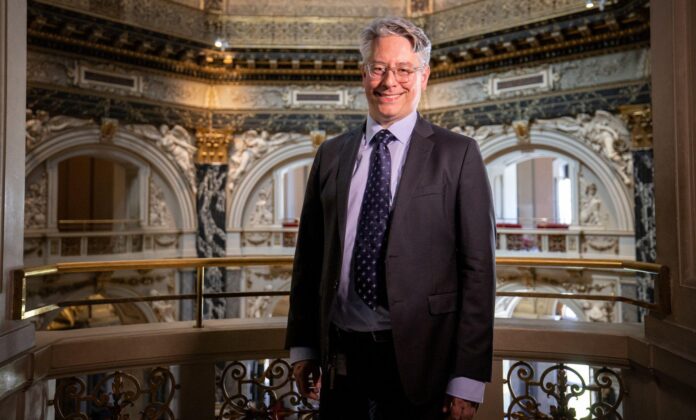Jonathan Fine’s path from a childhood in New York to being appointed director general of Vienna’s Kunsthistorisches Museumsverband has taken some twists, including many years practising as a lawyer. Since July 2021, he has served as scientific director of the Weltmuseum in Vienna—one of the museums he will be overseeing when he starts in his new post in 2025.
His two years in Vienna—plus a Ph.D. in art history that involved study of the Habsburg collections—have given him insight into the institution he will be running. His top priority, he says, is raising the KHM’s international profile.
“When you compare us to peer institutions in other countries, we are just less well known—even though the collections are similarly spectacular,” he says. “The second priority is not just increasing our public but really working to open the house to broader audiences to make it more approachable. I would like to see Vienna’s citizens feel at home here and think of it as their living room and entertainment space outside of the house.”

The Kunsthistorisches Museum in Vienna © Daniel J. Schwarz
From 1 January 2025, Fine will be responsible for the Kunsthistorisches Museum, the Weltmuseum and the Austrian Theatre Museum. Their holdings, largely the fruit of centuries of fervent collecting by Habsburg emperors and archdukes, range from Egyptology, coins, armoury and paintings to natural wonders and artefacts accumulated on multiple expeditions to distant parts of the world.
At a press conference in Vienna on Thursday to announce the appointment, Andrea Mayer, the culture minister, said Fine “understands the burning issues museums face today” and “stands for a thoroughly modern concept of a museum that addresses social questions.”
Born in New York in 1969, Fine earned bachelor’s degrees in history from the University of Chicago and in English literature from Cambridge University, and a professional degree in law from Yale University. His Ph.D. in Art History from Princeton University focussed on beaded thrones from the Bamum kingdom in Cameroon. He says he owes his perfect German to a student exchange programme that took him to West Germany for a year aged 14.
Fine says his years practising as a lawyer focussing on international commercial disputes, constitutional law and human rights are helpful to his current and future roles.
“Being a lawyer trains you to see problems from many different sides,” he says. “And to not just think there’s one answer to complicated problems, but to approach them with objectivity.”
Before taking up his post in Vienna, Fine served as head of collections at Berlin’s Ethnology Museum and curator for collections from Western Africa, Cameroon, Gabun and Namibia. He was closely involved in the museum’s plans to return its Benin bronzes to Nigeria.
Soon after arriving in Austria, he was appointed to lead an expert commission that last week presented recommendations to the government on how to handle restitutions of objects in national museums acquired in a colonial context.
“That topic is one I will carry with me as I make the transition from Weltmuseum director to general director of the Kunsthistorisches Museumsverband,” he says. Not only the Weltmuseum but also the Kunsthistorisches Museum has collections that could be affected by a new law, he says.
A third priority, he says, will be sustainability—both ecologicial and economic.
“There are a lot of processes that we can rethink,” he says.“There are great strides being made in other institutions towards making a more sustainable model for museums and that’s going to be very important to me.”

























